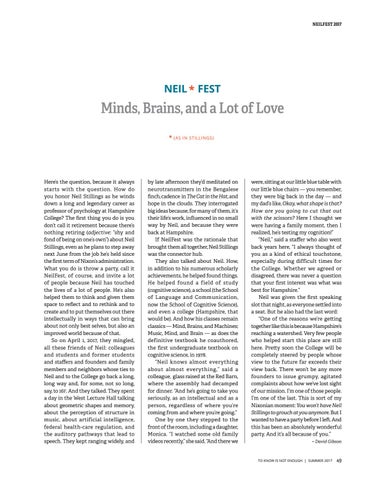NEILFEST 2017
NEIL * FEST
Minds, Brains, and a Lot of Love *
Here’s the question, because it always starts with the question. How do you honor Neil Stillings as he winds down a long and legendary career as professor of psychology at Hampshire College? The first thing you do is you don’t call it retirement because there’s nothing retiring (adjective: “shy and fond of being on one’s own”) about Neil Stillings, even as he plans to step away next June from the job he’s held since the first term of Nixon’s administration. What you do is throw a party, call it NeilFest, of course, and invite a lot of people because Neil has touched the lives of a lot of people. He’s also helped them to think and given them space to reflect and to rethink and to create and to put themselves out there intellectually in ways that can bring about not only best selves, but also an improved world because of that. So on April 1, 2017, they mingled, all these friends of Neil: colleagues and students and former students and staffers and founders and family members and neighbors whose ties to Neil and to the College go back a long, long way and, for some, not so long, say, to 16F. And they talked. They spent a day in the West Lecture Hall talking about geometric shapes and memory, about the perception of structure in music, about artificial intelligence, federal health-care regulation, and the auditory pathways that lead to speech. They kept ranging widely, and
(AS IN STILLINGS)
by late afternoon they’d meditated on neurotransmitters in the Bengalese finch, cadence in The Cat in the Hat, and hope in the clouds. They interrogated big ideas because, for many of them, it’s their life’s work, influenced in no small way by Neil, and because they were back at Hampshire. If NeilFest was the rationale that brought them all together, Neil Stillings was the connector hub. They also talked about Neil. How, in addition to his numerous scholarly achievements, he helped found things. He helped found a field of study (cognitive science), a school (the School of Language and Communication, now the School of Cognitive Science), and even a college (Hampshire, that would be). And how his classes remain classics — Mind, Brains, and Machines; Music, Mind, and Brain — as does the definitive textbook he coauthored, the first undergraduate textbook on cognitive science, in 1978. “Neil knows almost everything about almost everything,” said a colleague, glass raised at the Red Barn, where the assembly had decamped for dinner. “And he’s going to take you seriously, as an intellectual and as a person, regardless of where you’re coming from and where you’re going.” One by one they stepped to the front of the room, including a daughter, Monica. “I watched some old family videos recently,” she said. “And there we
were, sitting at our little blue table with our little blue chairs — you remember, they were big back in the day — and my dad’s like, Okay, what shape is that? How are you going to cut that out with the scissors? Here I thought we were having a family moment, then I realized, he’s testing my cognition!” “Neil,” said a staffer who also went back years here, “I always thought of you as a kind of ethical touchstone, especially during difficult times for the College. Whether we agreed or disagreed, there was never a question that your first interest was what was best for Hampshire.” Neil was given the first speaking slot that night, as everyone settled into a seat. But he also had the last word: “One of the reasons we’re getting together like this is because Hampshire’s reaching a watershed. Very few people who helped start this place are still here. Pretty soon the College will be completely steered by people whose view to the future far exceeds their view back. There won’t be any more founders to issue grumpy, agitated complaints about how we’ve lost sight of our mission. I’m one of those people. I’m one of the last. This is sort of my Nixonian moment: You won’t have Neil Stillings to grouch at you anymore. But I wanted to have a party before I left. And this has been an absolutely wonderful party. And it’s all because of you.” – David Gibson
TO KNOW IS NOT ENOUGH | SUMMER 2017
49
